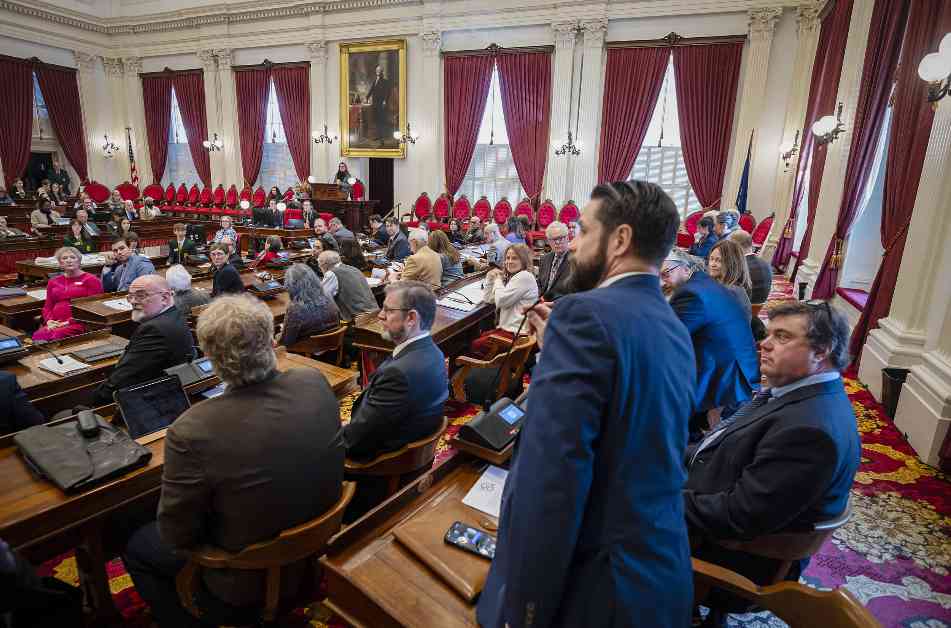The Vermont House Makes a Budget Tune-Up with Controversy Over Shelter Program
The Vermont House recently gathered in the House chamber at the Statehouse in Montpelier to pass a critical piece of legislation. This bill, known as H.141, would adjust state spending in the middle of the fiscal year, with a significant focus on the state’s budget for the 2025 fiscal year. The debate surrounding this bill has been intense, particularly concerning the inclusion of funding for the state’s motel voucher program, which has sparked sharp pushback from various quarters.
In the past week, the House has been in deliberations over the proposed changes to the budget. While there seems to be a general consensus between House members and Governor Phil Scott, there are key areas of contention that have caused a stir. The bill seeks to increase 2025 spending by $161 million, $15 million more than what the governor initially proposed, raising questions about the distribution of resources and future implications for the state’s finances.
House’s Budget Adjustment and Its Implications
The bill, H.141, aims to address the evolving financial landscape of Vermont, leveraging a recent revenue upgrade to alleviate cost pressures on the state government. Lawmakers have identified rising healthcare costs as a primary area of concern, prompting adjustments to state spending policies. This includes a reduction of approximately $13 million in funding for a state childcare subsidy program that has seen lower than expected usage. While the House has largely aligned with the governor’s proposed changes, there are key discrepancies that have drawn attention.
Rep. Robin Scheu, chair of the House Appropriations Committee, highlighted the areas of agreement with Governor Scott, emphasizing that over 99% of the proposed adjustments were in sync. However, the remaining 1% has sparked a significant debate among House members. The inclusion of an additional $1.8 million for the motel voucher program, extending eligibility for select individuals, has been met with both support and opposition. This contentious issue has underscored the broader discourse surrounding social welfare programs and government assistance.
Debates, Apologies, and Policy Disagreements
During the floor debate, emotions ran high, with one House member issuing an apology for remarks made in the heat of the moment. The discourse around the motel voucher program has raised questions about the role of government in providing essential services and the balance between individual responsibility and collective support. While some lawmakers expressed concerns about the long-term implications of extending housing eligibility, others argued for the importance of safeguarding vulnerable populations during times of uncertainty.
Rep. Tiff Bluemle emphasized the human impact of the budget adjustments, noting that the $1.8 million allocation would prevent hundreds of households from facing housing insecurity. This sentiment was echoed by various members from different political affiliations, highlighting the nuanced nature of budgetary decisions and their real-world consequences. As the debate continues, voices from all sides are seeking to navigate a path forward that balances fiscal prudence with social responsibility.
In response to the House’s decision, Governor Scott expressed his opposition to extending cold weather eligibility rules, advocating instead for increased congregate shelter capacity. He raised concerns about the efficacy of the motel voucher program, calling it a “failed policy” that requires reevaluation. The tension between state officials and lawmakers underscores the complexity of governance and the challenges of addressing societal needs within budgetary constraints.
As Vermont navigates the intricacies of its mid-year budget adjustments, the discussions within the Statehouse shed light on the competing priorities and values at play. The decisions made in the coming weeks will not only shape the state’s financial landscape but also reflect its commitment to supporting those in need. The intersection of policy, politics, and compassion will continue to define Vermont’s approach to governance and social welfare.










